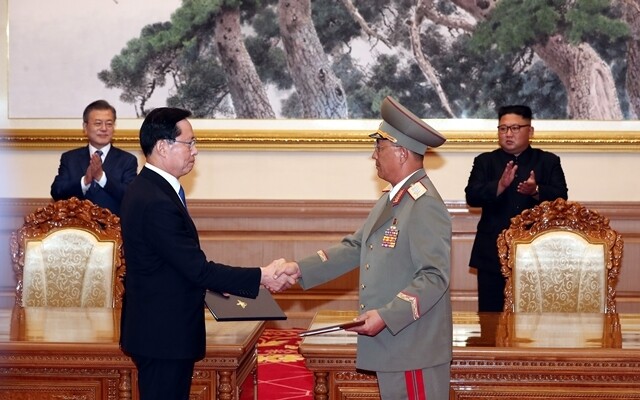hankyoreh
Links to other country sites 다른 나라 사이트 링크
[Editorial] Two Koreas need to revive original spirit of Panmunjom Declaration

Sept. 19 marks the first anniversary since an inter-Korean summit was held in Pyongyang last year. During that summit, the leaders of South and North Korea released historic agreements: the Pyongyang Joint Declaration and a military agreement designed to implement the Panmunjom Declaration. These were sweeping agreements that pledged that the two sides would work to ease military tensions. But a year later, we find ourselves wondering how well the spirit of those agreements has been honored.
In the military agreement, South and North Korea agreed to halt all hostile activity by land, sea, and air and to take practical measures to transform the DMZ into a zone of peace. They further agreed to take military measures to turn the area around the Northern Limit Line (NLL) in the West Sea into “waters of peace.” The result has been a cessation of hostile behavior in the border region, the probationary withdrawal from guard posts in the demilitarized zone (DMZ), and the demilitarization of the Joint Security Area (JSA) at Panmunjom. Roads were also linked in Chorwon County in order to facilitate the joint exhumation of soldier remains.
But joint action by South and North Korea halted after the North Korea-US summit held in Hanoi in February ended inconclusively. North Korea has raised tensions by launching short-range projectiles on no fewer than 10 occasions since May. South Korea has also recreated the confrontational mood of the past by carrying out joint exercises with the US and by acquiring F-35A stealth fighters. While it’s encouraging that South and North Korea are refraining from hostile activity per se, in line with the agreement, their apparent rush into a conventional arms race is not a good sign. The two sides must return to the spirit with which they signed the military agreement last year. In particular, the leaders of South and North Korea need to work together to quickly set up the joint military committee, as agreed. That committee must be in operation if South and North Korea are to cooperate together to build military confidence and enact arms control.
It’s undeniable that the primary reason that progress on inter-Korean agreements, including the military one, has fizzled out is because the North Korea-US denuclearization talks have run aground. It’s critical to escape from the vicious cycle in which a deadlock in North Korea-US negotiations puts a strain on inter-Korean relations. Inevitably, therefore, we must take a great interest in the North Korea-US working-level negotiations. But while working to facilitate progress in those negotiations, the South Korean government must not be remiss in its separate effort to improve inter-Korean relations. The last year has shown that getting too obsessed about progress in North Korea-US relations might actually cause us to lose ground in inter-Korean relations.
Please direct comments or questions to [english@hani.co.kr]
Caption: South Korean President Moon Jae-in and North Korean leader Kim Jong-un observe as defense ministers from both sides sign the Comprehensive Military Agreement and exchange documents in Panmunjom at the Paekhwawon State Guest House in Pyongyang on Sept. 19, 2018. (photo pool)
Editorial・opinion
![[Editorial] Intensifying US-China rivalry means Seoul must address uncertainty with Beijing sooner than later [Editorial] Intensifying US-China rivalry means Seoul must address uncertainty with Beijing sooner than later](https://flexible.img.hani.co.kr/flexible/normal/500/300/imgdb/original/2024/0517/8117159322045222.jpg) [Editorial] Intensifying US-China rivalry means Seoul must address uncertainty with Beijing sooner than later
[Editorial] Intensifying US-China rivalry means Seoul must address uncertainty with Beijing sooner than later![[Column] When ‘fairness’ means hate and violence [Column] When ‘fairness’ means hate and violence](https://flexible.img.hani.co.kr/flexible/normal/500/300/imgdb/original/2024/0516/7417158465908824.jpg) [Column] When ‘fairness’ means hate and violence
[Column] When ‘fairness’ means hate and violence- [Editorial] Yoon must stop abusing authority to shield himself from investigation
- [Column] US troop withdrawal from Korea could be the Acheson Line all over
- [Column] How to win back readers who’ve turned to YouTube for news
- [Column] Welcome to the president’s pity party
- [Editorial] Korea must respond firmly to Japan’s attempt to usurp Line
- [Editorial] Transfers of prosecutors investigating Korea’s first lady send chilling message
- [Column] Will Seoul’s ties with Moscow really recover on their own?
- [Column] Samsung’s ‘lost decade’ and Lee Jae-yong’s mismatched chopsticks
Most viewed articles
- 1[Editorial] Transfers of prosecutors investigating Korea’s first lady send chilling message
- 2For new generation of Chinese artists, discontent is disobedience
- 3[Photo] 1,200 prospective teachers call death of teacher “social manslaughter”
- 4[Exclusive] Unearthed memo suggests Gwangju Uprising missing may have been cremated
- 5S. Korea “monitoring developments” after report of secret Chinese police station in Seoul
- 6[Column] US troop withdrawal from Korea could be the Acheson Line all over
- 7Xi, Putin ‘oppose acts of military intimidation’ against N. Korea by US in joint statement
- 8[Column] Samsung’s ‘lost decade’ and Lee Jae-yong’s mismatched chopsticks
- 9[Column] When ‘fairness’ means hate and violence
- 10[Editorial] Intensifying US-China rivalry means Seoul must address uncertainty with Beijing sooner t